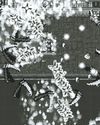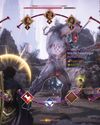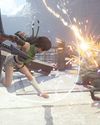How Bungie went back to the beginning for its Halo swansong.

How do you say goodbye to the series that defined your studio, and helped launch and sustain an entire console platform, after nearly a decade? If you’re Bungie, on the cusp of leaving Microsoft to embrace its own Destiny, you go back to the beginning – 2001’s Halo: Combat Evolved – and then back further still.
The developer’s final Halo game abandons the ongoing storyline of Master Chief, last of the armoured super-soldiers known as Spartans. Instead, it opts for a prequel set, Rogue One-style, in the moments immediately before the first game.
Human colonists living on the eponymous planet of Reach make first contact with the Covenant alien forces. They do not come in peace. Noble Team, a squad of Spartans, is deployed to fight back. It is, ultimately, a doomed mission. The game makes no secret of this, opening on a shot of a Spartan’s helmet – neatly colour-coded to match your own customisable character – abandoned in the dust, its visor terminally cracked. Just like Rogue One, the story’s one of a small group of soldiers who give their lives to set the events of the main saga in motion.
And it’s not just Reach’s story which winds back the clock. The prequel setting allowed Bungie to erase some of the factors that had complicated the games since Combat Evolved. Gone are the zombie-like Flood and floating Sentinels, enemies that upset the delicate balance of Halo’s gunplay. The dual-wielding of sidearms introduced by the second game, and the incendiary and spike grenades added in the third, are also dropped. It’s a streamlining of the formula, refocusing around the core ‘golden triangle’ design. This is how Bungie refers to Halo combat’s mix of shooting, grenades and melee attacks – all interlinked in a twitch reflex game of rock, paper, scissors.
Denne historien er fra February 2019-utgaven av Edge.
Start din 7-dagers gratis prøveperiode på Magzter GOLD for å få tilgang til tusenvis av utvalgte premiumhistorier og 9000+ magasiner og aviser.
Allerede abonnent ? Logg på
Denne historien er fra February 2019-utgaven av Edge.
Start din 7-dagers gratis prøveperiode på Magzter GOLD for å få tilgang til tusenvis av utvalgte premiumhistorier og 9000+ magasiner og aviser.
Allerede abonnent? Logg på

BONAPARTE: A MECHANIZED REVOLUTION
No sooner have we stepped into the boots of royal guard Bonaparte than we’re faced with a life-altering decision.

TOWERS OF AGHASBA
Watch Towers Of Aghasba in action and it feels vast. Given your activities range from deepwater dives to climbing up cliffs or lumbering beasts, and from nurturing plants or building settlements to pinging arrows at the undead, it’s hard to get a bead on the game’s limits.

THE STONE OF MADNESS
The makers of Blasphemous return to religion and insanity

Vampire Survivors
As Vampire Survivors expanded through early access and then its two first DLCs, it gained arenas, characters and weapons, but the formula remained unchanged.

Devil May Cry
The Resident Evil 4 that never was, and the Soulslike precursor we never saw coming

Dragon Age: The Veilguard
With Dragon Age: The Veilguard, BioWare has made a deeply self-conscious game, visibly inspired by some of the best-loved ideas from Dragon Age and Mass Effect.

SKATE STORY
Hades is a halfpipe

SID MEIER'S CIVILIZATION VII
Firaxis rethinks who makes history, and how it unfolds

FINAL FANTASY VII: REBIRTH
Remaking an iconic game was daunting enough then the developers faced the difficult second entry

THUNDER LOTUS
How Spirit farer's developer tripled in size without tearing itself apart